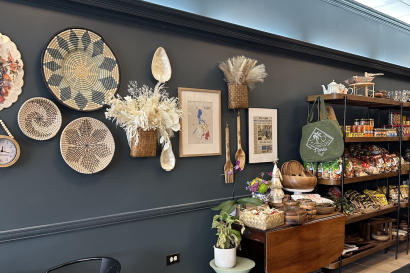On Wednesday, we went to La Sureña with Pato and Parker, two spring semester students, and César, one of their Spanish friends.
“You have to be careful with your iPhone if you’re going to take it out with you,” Pato said, gesturing at Jackie.
“I usually only take this with me,” Jackie said, holding up the same crappy Samsung that we all bought on the first day. It is red. It is a flip phone, the first one I’ve held in my hands since 2007. “Would they steal this from me?” she asked. Pato burst out laughing.
“Yes!” César wanted to know what we’re happening out. Pato explained, “Se robaría esto móvil?” he asked.
“Sí, sí,” César said. Parker explained to us how many pickpocketers there were.
“I learned the hard way when I took a photo with my iPhone at a club…with the flash on,” he said.
“If they see an iPhone, they will follow you,” Pato said. I must have made face of disgust or said something along the lines of Oh my God.
“But it’s not like getting mugged,” Parker said. “It’s like, friendly pickpocketing. If you catch them, they’ll just put their hands in the air and back away,” he said, imitating the stance. He looked like a sheepish drug dealer caught on an episode of Cops. “I’d get mad and want to fight them, but they don’t want any trouble.”
The difference between the kids who have been here for a semester and the kids who are just getting to Madrid is so clear it’s almost depressing. The semester kids really want to give advice; they are a font of information, and yes, they tell you to watch out for pickpocketers, but that’s what everyone says. They’ll tell you what restaurants and bars to go, etc. But they also have a sort of exhaustion about them. They’re out of money, so they can barely afford to feed themselves. They’re out of minutes on their phones so they can’t talk to anyone. They’ve let their metro cards lapse, so they can’t go anywhere. They are mentally exhausted from exams.
And yet they still have so much more energy than us. That night we stayed out until 4:30 in the morning, which I don’t recommend when you have class at 9:30 in the morning.
Here’s the thing – Madrileños just do their lives differently. They get up at the same time but they stay out much later. According to mi profesora, la siesta es un mito, or a myth. If you’re working then you have no time to take a two hour nap. Which to me, raises questions like,
When are you supposed to sleep?
Luckily I get out of class at 1, and I fell asleep so aggressively that I wouldn’t really even call it sleep so much as I would call it being dead temporarily. When Lindsay woke me up to go on our paseo histórico, or historical walk, I felt like someone had hit me with a truck.
“Bria, get up,” she said from the doorway.
“Mmeera daslulf,” I said into my pillow.
“I made you coffee,” she said.
“What? What’s wrong with you? You’re awesome!” I said. Lindsay placed a cup of coffee on my desk and I heard her walking away, saying,
“Did you hear what Bria just said to me? Ha ha ha.”
The historic walk was a really good time, despite the fact that we showed up 20 minutes late after going the wrong way on the metro.
The guide spoke to us in Spanish, and for the first time I understood why I was forced to memorize what seemed like pointless words during my many years of Spanish classes. Words like gremio (guild), or terciopelo (velvet), or muletas (crutches). I remember every vocab list and I also remember banging my head against my desk, cursing the gods and my Spanish teachers in turn for pushing important information out of my brain and replacing it with words like frenos and tartamudear. But it’s worth it, once you travel to Spain and show off your oddly prodigious and at times obscure Spanish vocabulary.

Bria Godley
<p><span style="color: rgb(29, 29, 29); font-family: Arial, Verdana, sans-serif; font-size: 12px; line-height: normal; background-color: rgb(237, 237, 237);">Bria Godley is a psychology major at Yale University from Chapel Hill, North Carolina. She gained her passion for travel as a child when she traveled to Europe, Asia, Australia and South America with her family and hopes to continue to travel throughout the rest of her life. Academically, Bria is interested in neuroscience, philosophy, and literature. Bria’s extracurricular interests include singing, writing, and taking multiple naps per day. She looks forward to chronicling her time in Madrid.</span></p>








